
Joseph Garat (31 December 1872, Bayonne - December 1944, Bayonne) was a former mayor of Bayonne. He is known for being implicated in the Stavisky Affair.

Joseph Garat (31 December 1872, Bayonne - December 1944, Bayonne) was a former mayor of Bayonne. He is known for being implicated in the Stavisky Affair.
A doctor in law, with a diploma from the École libre des sciences politiques in Paris, Joseph Garat practised as a lawyer until 1910, when he was elected a deputy and gave up practising law. A conseiller municipal of Bayonne from 1900, he was elected the town's mayor in 1908. Thus began the city's "first Garatist era", then he was re-elected mayor in 1912 and deputy in 1914. He was also elected a conseiller général in 1909, 1910 and 1928.
Garat retired from politics and between 1919 and 1924 worked in a, dans un "cabinet d'affaires" in Paris. He re-took his seat as a deputy in May 1924, then became mayor of Bayonne again in 1925, thus beginning the "second Garatist era". He won all the elections - he was re-elected as deputy in 1928 and 1932, and as mayor in 1929. I
In 1933 he was implicated in the Stavisky Affair. Imprisoned in Bayonne in January 1934, he was dismissed as mayor and conseiller municipal. The Radical Party decided on his exclusion in March 1934. At his trial in 1936, he was charged with lying in public writings and complicity in embezzlement and fraud. In effect, he was president of the Conseil d'administration of the Crédit municipal de Bayonne, an organisation founded by the notorious fraudster Stavisky, who was the originator of the scandal, which had allowed the misappropriation of tens of millions of francs. Garat was condemned to two years in prison. The Stavisky affair having marked his political death, he died in Bayonne in 1944, forgotten despite his important political career.
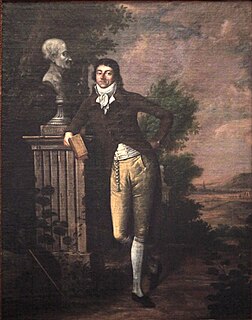
Dominique Joseph Garat was a French Basque writer and politician.
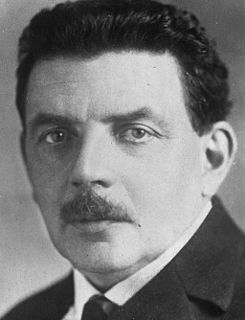
Édouard Marie Herriot was a French Radical politician of the Third Republic who served three times as Prime Minister and for many years as President of the Chamber of Deputies. He was leader of the first Cartel des Gauches.
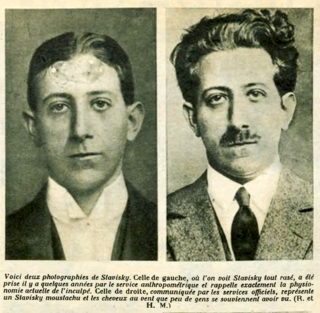
The Stavisky Affair, involving embezzler Alexandre Stavisky, was a financial scandal in France in 1934. The scandal had political ramifications for the Radical Socialist moderate government of the day when it was revealed that Prime Minister Camille Chautemps had protected Stavisky, who suddenly died in mysterious circumstances. The political right engaged in large anti-government demonstrations on 6 February 1934, resulting in Paris police firing upon and killed fifteen demonstrators. A right-wing coup d'état seemed like a possibility at the time, but historians agree that the multiple right-wing forces were uncoordinated and not trying to overthrow the government.
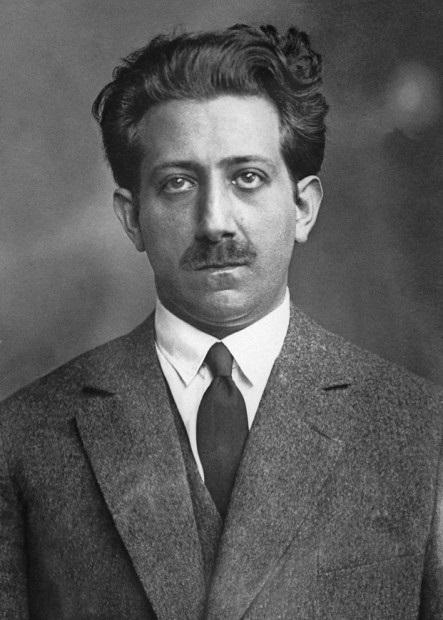
Serge Alexandre Stavisky was a French financier and embezzler whose actions created a political scandal that became known as the Stavisky Affair.

The Mayor of San Jose, officially the Mayor of the City of San José, is executive of the Government of the City of San Jose.

Stavisky... is a 1974 French biographical drama film based on the life of the financier and embezzler Alexandre Stavisky and the circumstances leading to his mysterious death in 1934. This gave rise to a political scandal known as the Stavisky Affair, which led to fatal riots in Paris, the resignation of two prime ministers and a change of government. The film was directed by Alain Resnais and featured Jean-Paul Belmondo as Stavisky and Anny Duperey as his wife, Arlette. Stephen Sondheim wrote the film's musical score.
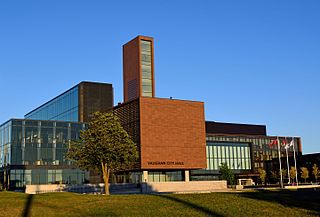
Vaughan City Council is the lower-tier municipal governing body for the city of Vaughan, Ontario. It is a part of the upper-tier Regional Municipality of York. Members of the council are elected in three categories: wards councillors, citywide councillors, and a mayor. The wards have remained consistent since the 2010 election.

The 6 February 1934 crisis was an anti-parliamentarist street demonstration in Paris organized by multiple far-right leagues that culminated in a riot on the Place de la Concorde, near the seat of the French National Assembly. The police shot and killed 15 demonstrators. It was one of the major political crises during the Third Republic (1870–1940). Frenchmen on the left feared it was an attempt to organize a fascist coup d'état. According to historian Joel Colton, "The consensus among scholars is that there was no concerted or unified design to seize power and that the leagues lacked the coherence, unity, or leadership to accomplish such an end."
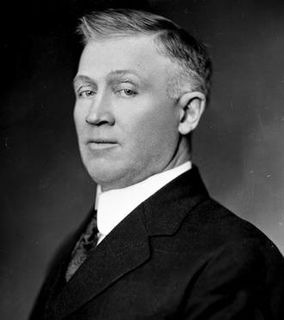
Joseph Andrew Clarke was a Canadian politician and lawyer. He served twice as mayor of Edmonton, Alberta, was a candidate for election to the House of Commons of Canada and the Legislative Assembly of Alberta, and was a member of the Yukon Territorial Council.

Pierre Cot, was a French politician and leading figure in the Popular Front government of the 1930s. Born in Grenoble into a conservative Catholic family, he entered politics as an admirer of the World War I conservative leader Raymond Poincaré, but moved steadily to the left over the course of his career. Through the decrypting of 1943 Soviet intelligence cables through the Venona Project it was established that Cot was an agent of the Soviet Union with the code name of "Dedal". However, other sources suggest that Cot was a communist fellow-traveller rather than an agent. The British Secret Intelligence Service describes him as "a highly controversial figure, vilified at the time by the French Right, and since accused of having been a Soviet agent".
The Independent Radicals were a right-of-centre French political current during the French Third Republic. It was slightly to the right of the more famous Radical-Socialist Party, and shared many doctrinal features in common. The prominent political scientist André Siegfried described them as "Social [that is, economic] conservatives who did not want to break with the Left, and who therefore voted with the Right on [economic] interests, and with the Left on political issues".

Oscar Drouin was a politician in Quebec, Canada.
Georges Suarez (1890–1944) was a French writer, essayist and journalist. Initially a pacifist, then a collaborator, he was also the biographer of Pétain and other figures of the Troisième République. He was the first journalist sentenced to death during the Épuration légale.

Louis-Paul Aujoulat was a French politician and missionary doctor. Following his long and illustrious political career he served as France's representative to the World Health Organization.
Hans Prydz was a Norwegian physician and politician for the Conservative Party.
Christen Knudsen was a Norwegian ship-owner and politician for the Conservative Party and later Nasjonal Samling.

Henry Frédéric Chéron was a French lawyer and politician who became active in local politics in the Calvados department of Normandy while still a young man, and always maintained his roots in Normandy. He was elected to the Chamber of Deputies and then to the Senate, and held various ministerial posts between 1913 and 1934. He generally held moderately conservative views, believed in fiscal responsibility and balanced budgets, and felt strongly that agriculture was the foundation of France's prosperity.

Louis Marie Joseph Etienne Rollin was a French politician who was a minister in several cabinets in the period between the two world wars.

Albert François Marie Dalimier was a French politician. Between 1932 and 1934 he was Minister of Labor, Minister of the Colonies (twice) and Minister of Justice in four of the short-lived cabinets of that period. He was forced to resign during the scandal of the Stavisky Affair in January 1934, since his advice as Minister of Labor may have made the embezzlement possible.

Jean Jacques Raynaldy, known as Eugène Raynaldy, was a French politician who was a deputy from 1919 to 1928 and a senator from 1930 to 1938. He was Minister of Commerce and Industry in 1924–25 and Minister of Justice in 1933–34.